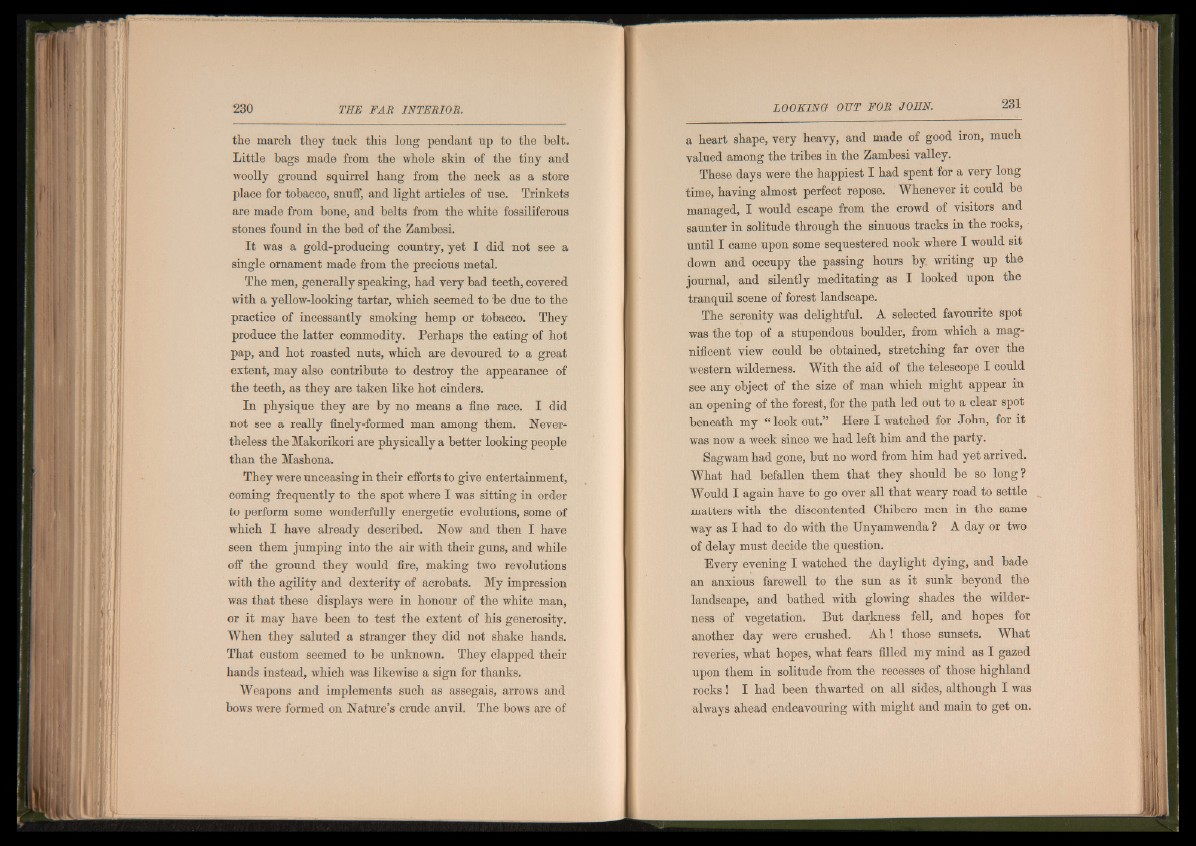
the inarch they tuck this long pendant up to the belt.
Little bags made from the whole skin of the tiny and
woolly ground squirrel hang from the neck as a store
place for tobacco, snuff, and light articles of use. Trinkets
are made from bone, and belts from the white fossiliferous
stones found in the bed of the Zambesi.
I t was a gold-producing country, yet I did not see a
single ornament made from the precious metal.
The men, generally speaking, had very bad teeth, covered
with a yellow-looking tartar, which seemed to be due to the
practice of incessantly smoking hemp or tobacco. They
produce the latter commodity. Perhaps the eating of hot
pap, and hot roasted nuts, which are devoured to a great
extent, may also contribute to destroy the appearance of
the teeth, as they are taken like hot cinders.
In physique they are by no means a fine race. I did
not see a really finely-formed man among them. Nevertheless
the Makorikori are physically a better looking people
than the Mashona.
They were unceasing in their efforts to give entertainment,
coming frequently to the spot where I was sitting in order
to perform some wonderfully energetic evolutions, some of
which I have already described. Now and then I have
seen them jumping into the air with their guns, and while
off the ground they would fire, making two revolutions
with the agility and dexterity of acrobats. My impression
was that these displays were in honour of the white man,
or it may have been to test the extent of his generosity.
When they saluted a stranger they did not shake hands.
That custom seemed to be unknown. They clapped their
hands instead, which was likewise a sign for thanks.
Weapons and implements such as assegais, arrows and
bows were formed on Nature’s crude anvil. The bows are of
a heart shape, very heavy, and made of good iron, much
valued among the tribes in the Zambesi valley.
These days were the happiest I had spent for a very long
time, having almost perfect repose. Whenever it could be
managed, I would escape from the crowd of visitors and
saunter in solitude through the sinuous tracks in the rocks,
until I came upon some sequestered nook where I would sit
down and occupy the passing hours by, writing up the
journal, and silently meditating as I looked upon the
tranquil scene of forest landscape.
The serenity was delightful. A selected favourite spot
was the top of a stupendous boulder, from which a magnificent
view could be obtained, stretching far over the
western wilderness. With the aid of the telescope I could
see any object of the size of man which might appear in
an opening of the forest, for the path led out to a clear spot
beneath my “ look out.” Here I watched for John, for it
was now a week since we had left him and the party.
Sagwam had gone, but no word from him had yet arrived.
What had befallen them that they should be so long?
Would I again have to go over all that weary road to settle
matters with the discontented Chibero men in the same
way as S had to do with the Unyamwenda ? A day or two
of delay must decide the question.
Every evening I watched the daylight dying, and bade
an anxious farewell to the sun as it sunk beyond the
landscape, and bathed with glowing shades the wilderness
of vegetation. But darkness fell, and hopes for
another day were crushed. A h ! those sunsets. What
reveries, what hopes, what fears filled my mind as I gazed
upon them in solitude from the recesses of those highland
rocks! I had been thwarted on all sides, although I was
always ahead endeavouring with might and main to get on.